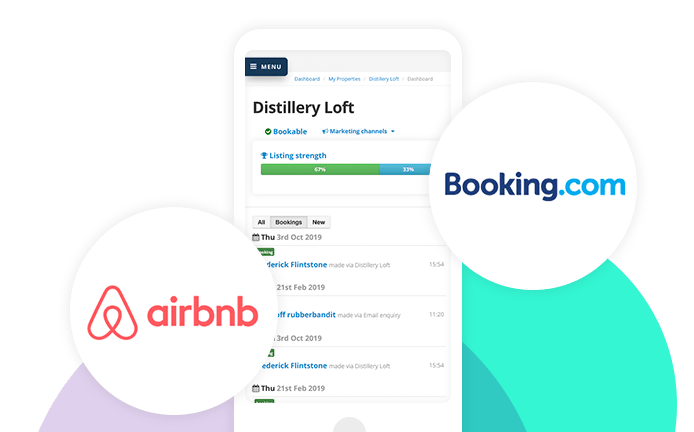To continue reading this article Register for an account - it's free!
Register nowAlready have an account? Sign in
4 minute read // updated

Attracting domestic tourists is a significant strategy for many property managers.
Find out what you should do first.

Consider changing up your images to include seasonal aspects. High quality photography of Easter eggs, and sunny views in the local area can capture attention and drive bookings.
To continue reading this article Register for an account - it's free!
Register nowAlready have an account? Sign in
Domestic tourism is a group of tourists who travel to a destination within a reasonable distance from their home, in their own country, state, or group of nations.
In the UK this is called a Staycation, or Nearcation.
During the Easter period, there is a surge of travel to enjoy the better weather and the school holidays.
As the Cost of Living Crisis affects many people, it is likely that these travellers are looking to reduce their travel expenses, by staying local.
Some travellers simply don't want to spend extensive periods of time flying internationally, when there are so many experiences to have locally.
This is an opportunity to attract local visitors, or Staycation guests to your holiday accommodation.
No.
And this group of travellers has become even more complex.
Previously, Staycation travellers may have chosen to stay local to:
But now Staycationers also includes travellers who would normally travel internationally but now can’t, for health, financial or other reasons.
This group may include people who:
As part of your plan to attract bookings to your holiday let, it is important to understand the domestic travellers who will be visiting your area.
Even if you previously attracted domestic guests, their needs may now be very different.
Armed with this information, you can weigh up the opportunities for your vacation rental property.
Domestic travellers may have a different budget than the international guests, so it is important to understand where your property prices lie with respect to their budgets.
It may mean that you have to decrease rates to attract domestic travellers, or you may find that your prices are well suited to them already.
The important point here is to review your prices carefully.
In some countries, domestic travellers may be happy to pay slightly more for their stay as there are fewer outgoing travel costs.
Additionally, increased demand for local properties may mean that rental prices can be increased.
Setting your prices is not a one-off exercise.
You should assess demand and occupancy regularly and review your prices.
Using a tool like Dynamic Pricing can help with this.
Guests who normally travel abroad or domestic travellers who do not normally travel locally may have different expectations for the amenities available.
Think about cultural needs and expectations and review:
The holidaymakers of now may have significantly different plans for their holiday than in the past.
There may still be a lower demand for children's soft plays, bustling markets, and most popular restaurants.
Instead, they may be looking for reassurance of the local health amenities in case of illness, outdoor spaces in the vacation rental, and hidden gems in the local area away from other people.
They may be looking for a place to relax and live slowly, with few trips to the outside world, and are looking to you to provide facilities for that.
This could be in the form of toys or a swing for the children, a BBQ and comfy chairs on the patio for the evening, a stocked bookshelf, and Netflix service.
There are many options and depend on your property type, your budget, and your potential guests' needs.
It’s not surprising that health is firmly on this list.
Depending on the age, type of group, and experience of your guests, their health concerns may vary.
Let's consider what would alleviate the concerns of your domestic travellers:
There are many types of domestic travellers - from single travellers to partners, friends, close families, extended families, and large groups.
So which group is best suited for your property? And what would they need?
For example, guests with small children would appreciate child safety features, child suitable toys, and the options for a cot.
Spend time thinking about what they would need, expect and want from your property - taking into consideration that this may have altered over the last few years.
Attracting and looking after a new type of guest is difficult, but it's important to provide a great guest experience.
Investigate what would provide an outstanding experience for them, and consider if you can provide it.
Exceeding expectations begins from the moment they first get in touch.
What we've seen is that the strength of your relationship may be the difference between a guest cancelling, or simply delaying a trip to your property if their circumstances change.
You can set up friendly automated emails to keep in touch.
Additionally, look at what pleases them?
Would a hand-written welcome note be an appreciated touch?
A discount from a local restaurant that can deliver?
A pre-arrival video call to talk through how to arrive?
Going the extra mile helps attract excellent reviews, repeat business, recommendations, and revenue.
Domestic travellers may have different booking preferences than your current set-up.
Review the options in your vacation rental software and channel manager - consider the preferences of your staycation guests.
At this time it is extra important to understand the needs of guests.
Consider changing up your images to include seasonal aspects.
High quality photography of Easter eggs, and sunny views in the local area can capture attention and drive bookings.
Do you have anything to add to this list? Let us know, and we’ll add it in.
Domestic travellers are a combination of different guest types, each with their own travel needs and concerns.
As Spring and Easter holidays approach, consider how you can be attracting this lucrative type of travel guest.